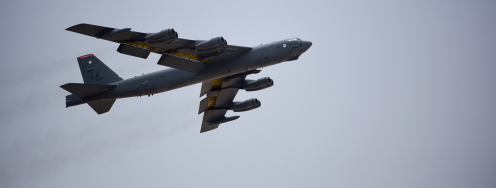Pentagon to Assess ICBM Reductions
On the radar: Environmental assessments on missile silos; New questions arise in Air Force cheating scandal; Sideline talks in Vienna; IAEA report shows uncommon progress; The importance of Hillary Clinton in Iran talks today; US, South Korea military drills test recent progress in North Korea diplomacy; MOX still over budget projections; and GAO takes Uranium Processing Facility to task.
February 24, 2014 | Edited by Lauren Mladenka and Geoff Wilson
ICBM assessments - “In a media release given Friday afternoon, Department of Defense spokeswoman Cynthia O. Smith confirmed that the department had recently requested the Air Force to begin an environmental assessment, which will collect information on the effects of eliminating no more than 50 Minuteman III intercontinental ballistic missile silos from Minot Air Force Base, Malmstrom AFB in Montana, and Francis E. Warren AFB in Wyoming. The three bases each maintain about a third of the country's Minuteman III arsenal of 448,” reports Dan Rudy for the Minot Daily News.
--“Smith explained that the decision was made as part of the effort to comply with the New Strategic Arms Reduction Treaty signed with Russia and ratified by the U.S. Senate in 2010. The agreement sets a deadline of Feb. 2018 for further limiting the two countries' nuclear weapons armaments following the expiration of the landmark START I agreement in 2009.”
--“The Department of Defense statement comes after Senators Heidi Heitkamp and John Hoeven of North Dakota joined their Montana colleagues in submitting a letter to Secretary of Defense Chuck Hagel on Thursday, expressing their strenuous opposition to any attempt by the Department of Defense to proceed with just such an assessment. The legal bone of contention is Section 8128 of the Consolidated Appropriations Act of 2014, which prohibits defense funding from going toward "any environmental impact analysis related to Minuteman III silos that contain a missile," which is a first step toward making silo reductions… To be in compliance with New START, the United States will need a further reduction of 109 deployed launchers, 138 warheads, and 215 deployed and non-deployed launchers.” Full story here. http://bit.ly/1bZJLME
Questioning the cheating scandal - “Last summer, when dozens of nuclear missile officers allegedly cheated on exams, test scores were among the lowest of the year, according to Air Force records obtained by The Associated Press. That is the opposite of what might be expected if answers were being shared as widely as officials allege,” writes Robert Burns for AP. “Were they inept cheaters? Was there, in fact, no sharing of answers during that period? Were test questions so difficult that even the cheating by some failed to produce higher-than-usual scores for the group as a whole?”
--“The Air Force isn’t saying. It notes that tests are not identical each month, and thus score ‘variances can be expected,’” Burns says. “The alleged cheating has been described as a symptom of mismanagement by commanders who have given too much weight to monthly test scores in determining which launch officers get promoted. More broadly, it reflects a degree of turmoil inside a force responsible for 450 nuclear-tipped Minuteman 3 missiles that stand launch-ready in underground silos in Montana, North Dakota, Wyoming, Colorado and Nebraska.” Read the full piece here. http://bo.st/1jtRy5e
Talks continue - “Iran and world powers will hold technical talks ‘next week’ in Vienna ahead of a political meeting to negotiate a comprehensive nuclear deal, a top Iranian negotiator said on Sunday. Iran and the P5+1 group of world powers agreed last week on a timetable and framework for the negotiations for an accord that would allay Western concerns about Iran's nuclear programme in return for the lifting of crippling sanctions… Cited by the official IRNA news agency, [Deputy Foreign Minister] Araqchi said the talks would take place on the sidelines of a meeting of the International Atomic Energy Agency's board of governors "next week". He did not specify dates, but the board is set to meet in Vienna from March 3 to 7.” Full report from AFP. http://bit.ly/NrDMoh
A first - “Over the past few years, reading the IAEA’s regular reports on Iran has become a bit tedious – much like a game of ‘Where’s Waldo,’ searching for the small bits and pieces that have changed, for better or worse. But with the implementation of the November Joint Plan of Action (JPOA) and separate agreements with the IAEA, the game has changed,” writes Laicie Heeley for the Nukes of Hazard blog. “My eyes almost don't know how to read an IAEA report with so much good news.”
--“Rather than list the same ongoing concerns and nuclear progress that was almost always for worse, the IAEA’s latest report shows that Iran is complying with the restrictions required by the November first step deal. For the first time in four years, the size of Iran’s stockpile of 20 percent enriched uranium has gone down. As required by the JPOA, the IAEA has confirmed that Iran is not enriching uranium above 5 percent at any of its declared facilities; is not operating any of its cascades in an interconnected configuration; is continuing to dilute and convert its stockpile of 20 percent enriched uranium (and currently has no process line to revert that converted fuel back into 20 percent); and has not conducted “any further advances” at its enrichment facilities at Natanz and Fordow or its heavy water reactor at Arak. This includes the installation of any additional IR-1 or IR-2 centrifuges.” Read the full piece here. http://bit.ly/NrCI3N
Testing ties - “South Korea kicked off its annual joint military exercises with the United States on Monday, despite vocal opposition from North Korea which will test a recent upswing in cross-border ties,” Giles Hewitt reports for the AFP. “The annual ‘Key Resolve’ and ‘Foal Eagle’ drills -- routinely condemned by North Korea as rehearsals for invasion -- will last until April 18 and involve a combined total of 12,700 US troops and many more from South Korea… Last year's drills fuelled an unusually sharp and protracted surge in military tensions, with Pyongyang threatening a pre-emptive nuclear strike, and nuclear-capable US stealth bombers making dummy runs over the Korean peninsula.” Full story here. http://bit.ly/1bFgTsK
MOX dispute - “According to a Public Integrity report, a study by the U.S. Department of Energy concluded that the construction cost of the MOX Fuel Fabrication Facility (MFFF) could be as high as $10 billion - almost 20% higher than the previous estimate of $7.7 billion. The total cost of the program to dispose 34 tonnes of weapons grade plutonium could be as high as $34 billion. Part of the increase is due to the fact that the utilities, who have been reluctant to use MOX fuel in their reactors, would likely ask DoE to pay a fee to do so.” Get the full story from the IPFM Blog here. http://bit.ly/1fxjt3r
Bad news for UPF - “The Uranium Processing Facility didn’t get great reviews when the Government Accountability Office folks took the stage at the recent Nuclear Deterrence Summit. Far from it,” writes Frank Munger for Knoxville News Sentinel. “The focus was NNSA’s management of big projects. UPF was the main topic.”
--“GAO officials found it difficult to create a success story out of UPF,” says Munger. According to one official, “the cost of the project has increased sevenfold to $6 billion-plus and there’s still much uncertainty about where it’ll end up. GAO and others are looking at why the same cost issues seem to happen again and again.” In short, the “UPF project that the Government Accountability Office has been reporting on is unlikely to be the one that is built.” Read the full article here. http://bit.ly/1k03gUH
Quick hits:
--“Clinton was right on Iran” by Pat Foote in the Ledger-Enquirer. http://bit.ly/1cglNrc
--”Iran’s Non-Oil Exports Recovering Under Rouhani, Business Says” by Andrew Torchia and Michelle Moghtader for Reuters. http://reut.rs/1fNxx57
Events:
--”Diplomatic Approaches to Security and Denuclearization in NE Asia: Prospects for NWFZ.” Discussion with Morton Halperin, Jae-Jung Suh, and Hiro Umebayashi. Feb. 25 from 3:00-5:00, 1100 15th St. NW, 11th floor. RSVP by email to info@pnnd.org.
--”Facing the Challenge of a Nuclear North Korea.” Discussion with Rep. Elliot Engel and Christopher Hill. Feb. 26 from 11:00-12:00 at 2253 Rayburn House Office Building. RSVP by email to dwertz@ncnk.org.
--“Toward a World Without Nuclear Weapons Testing.” Discussion with Karipbek Kuyukov and Roman Vassilenko, Ambassador of Kazakhstan. Feb. 26 from 12:30-2:00, George Washington University, Funger Hall room 209, 2201 G Street NW. RSVP here. http://bit.ly/1f9ozEl



